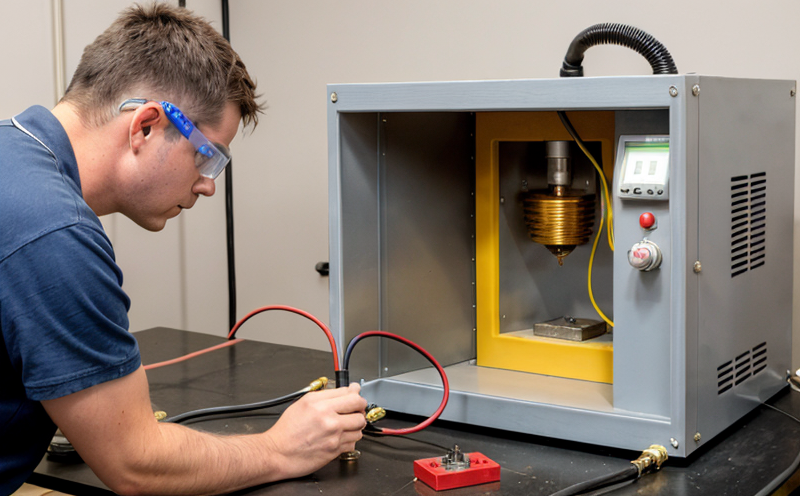ISO 9934 Magnetic Properties Testing of Ferromagnetic Metals
The ISO 9934 standard provides a comprehensive framework for measuring and characterizing the magnetic properties of ferromagnetic metals. This service is pivotal for ensuring that materials meet stringent performance criteria in various sectors, including aerospace, automotive, electronics, and manufacturing. Understanding the magnetic properties of these materials is crucial because they influence how well a material can be magnetized, its permeability, and coercivity.
The process begins with careful specimen preparation, which involves cleaning and conditioning the sample to ensure accurate measurement. The testing equipment used for ISO 9934 compliance includes specialized magnetometers that generate controlled magnetic fields of varying strengths. Specimens are then subjected to these fields under various conditions, allowing for detailed analysis.
During the test, the magnetic moment induced in the specimen is measured as a function of the applied magnetic field. This data helps determine key parameters such as saturation magnetization (Ms), remanence (Br), and coercivity (Hc). Saturation magnetization refers to the maximum magnetization that can be achieved by applying an external magnetic field, while remanence indicates the residual magnetic flux density after the external field is removed. Coercivity measures the strength of a material's resistance to being demagnetized.
The results from ISO 9934 testing are critical for quality assurance and product development teams. By ensuring that materials meet specified magnetic property requirements, businesses can enhance product performance, reliability, and safety. For instance, in aerospace applications, accurate knowledge of magnetic properties ensures the integrity of components subjected to high-stress environments.
Compliance with ISO 9934 also demonstrates a company's commitment to international standards, which is increasingly important as markets become more globalized. This service supports clients in achieving regulatory compliance and gaining competitive advantages by ensuring their products meet or exceed industry benchmarks.
- International Acceptance: The results of ISO 9934 testing are widely accepted across Europe (EN ISO), North America (ASTM E618), and Asia-Pacific regions, making it a universally recognized standard for ferromagnetic materials.
Why It Matters
The magnetic properties of ferromagnetic metals play a crucial role in determining their suitability for various applications. For instance, in the aerospace industry, the magnetic characteristics of structural components can affect their ability to withstand high-stress environments. Accurate measurement and control of these properties help ensure that materials perform reliably under extreme conditions.
In the automotive sector, understanding the coercivity of materials is essential for optimizing the design of electrical systems. Properly magnetized components contribute to improved efficiency and reduced energy consumption. For electronics manufacturers, remanence data is vital for designing reliable magnetic circuits in transformers and inductors.
By ensuring that ferromagnetic metals meet ISO 9934 standards, businesses can enhance their competitive advantage by delivering products that exceed industry expectations. This not only improves product quality but also fosters customer trust and satisfaction. Additionally, compliance with international standards can open doors to new markets and opportunities for business growth.
International Acceptance and Recognition
- ISO 9934: Widely recognized standard across Europe (EN ISO), North America (ASTM E618), and Asia-Pacific regions.
- EN ISO: European Norm, which aligns with ISO standards to ensure compatibility within the EU market.
- ASTM E618: American Society for Testing and Materials standard that provides additional guidance on testing methods and acceptance criteria.
The international recognition of ISO 9934 underscores its importance in ensuring consistent quality standards across different geographical regions. This uniformity simplifies compliance efforts and fosters global trade, as businesses can rely on a single set of test results for their materials.
Competitive Advantage and Market Impact
Compliance with ISO 9934 standards provides significant competitive advantages by ensuring that products meet the highest quality benchmarks. This is particularly important in highly regulated industries where non-compliance can lead to costly recalls and reputational damage.
By demonstrating adherence to international standards, companies can differentiate themselves in a crowded market. Consumers and regulatory bodies increasingly favor products that have been tested against recognized global standards. This not only enhances brand reputation but also opens up opportunities for expansion into new markets.
The ability to provide consistent and reliable magnetic properties is crucial for maintaining high product performance. In sectors like aerospace, where reliability is paramount, ISO 9934 testing ensures that materials can withstand the rigors of space travel or aviation. For automotive manufacturers, meeting these standards translates to more efficient vehicles with reduced carbon footprints.
Ultimately, adherence to ISO 9934 helps businesses stay ahead of industry trends and technological advancements. By ensuring that their products meet stringent magnetic property requirements, companies position themselves as leaders in innovation and quality.





